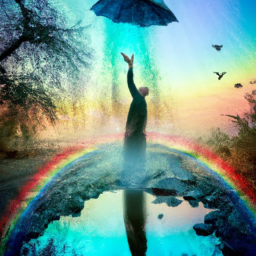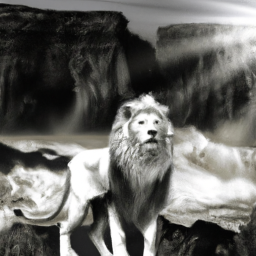As an individual who has a deep passion for all things related to streaming, I am always on the lookout for new and interesting content to add to my watchlist. Recently, I have been fascinated by movies and shows that explore the mysterious world of dreams. Whether it’s psychological thrillers or fantastical adventures, the fascination of delving into the inner workings of the mind is incredibly appealing.
The popularity of dream-themed entertainment has been steadily increasing in recent years, with more and more creators choosing to explore this enigmatic realm. As someone who has always been intrigued by the inner workings of the human psyche, I find myself particularly drawn to these types of stories.
In this article, I will be exploring some of my favorite dream-themed shows and movies that are currently available for streaming, as well as delving into why we as viewers seem to have such a deep-seated fascination with this subject matter.
So sit back, relax, and let’s dive headfirst into what dreams may come streaming.
Key Takeaways
- ‘What Dreams May Come’ is a dream-themed film available for streaming that explores themes like death, afterlife, and the meaning of existence.
- The film uses comedic dream interpretation to add depth and keep audiences engaged, and surreal landscapes and imagery transport viewers to another realm.
- The protagonist navigates through different planes of consciousness, each representing a layer of his subconscious, and filmmakers use dream interpretation techniques to convey symbolic meanings through visual metaphors.
- Symbolism adds depth and intrigue to dream-themed shows and movies, and recurring symbols or motifs throughout a film can help connect various plot points and reveal deeper themes.
The Fascinating World of Dreams
You’re probably wondering, what’s so fascinating about dreams? Well, let me tell you, they can transport you to a whole new world filled with endless possibilities.
Dreams have been the subject of scientific study for decades now. Researchers continue to explore the mysteries of our dream world and how it affects our waking life. From lucid dreaming to dream therapy and interpretation, there are many ways that people use their dreams as a tool for self-discovery.
Lucid dreaming is one of the most interesting aspects of the dream world. It occurs when a person becomes aware that they are dreaming and can actively control the events within it. This allows individuals to experience things that may not be possible in their waking lives. The ability to lucid dream has been studied by scientists who hope to better understand how our brains work during sleep.
Dream therapy is another way that people use their dreams for personal growth and healing. By analyzing recurring themes or symbols in their dreams, individuals can gain insight into their subconscious thoughts and emotions. Dream interpretation is also used in therapy sessions as a way to uncover underlying issues that may be affecting an individual’s mental health.
The fascination with dreams has led to an increase in popularity of dream-themed shows and movies such as ‘What Dreams May Come’. These productions allow viewers to explore the depths of their own imaginations while learning more about the human psyche. Through these stories, we are reminded of how powerful our minds truly are and how much potential lies within them.
As we delve deeper into the fascinating world of dreams, we discover new insights about ourselves every day. Whether through scientific study or personal exploration, there’s always something new to learn from this mysterious realm.
So let’s embrace this journey with open hearts and minds as we continue to unravel the secrets hidden within our subconsciousnesses without even realizing it!
The Popularity of Dream-Themed Shows and Movies
It’s no wonder that the entertainment industry is fixated on exploring the mysterious realm of slumber, with countless films and television shows depicting the surreal and often unsettling nature of our subconscious minds. As someone who’s always been fascinated by the science behind dreams, I find it intriguing to see how artists interpret these complex phenomena through their work.
Here are a few reasons why dream-themed movies and shows have become so popular:
-
They tap into our deepest fears and desires: Dreams can be incredibly revealing, providing insight into our innermost thoughts and emotions. When filmmakers capitalize on this vulnerability, they create stories that resonate with audiences on a visceral level.
-
They offer an escape from reality: In a world that can feel overwhelming at times, there’s something comforting about entering an alternate reality where anything is possible. Dream-themed media allows us to explore new worlds without leaving the comfort of our own homes.
-
They challenge our perceptions of reality: Dreams are notorious for being illogical and nonsensical, which makes them perfect fodder for storytelling. By presenting viewers with surreal imagery or non-linear narratives, these works force us to question what we think we know about ourselves and the world around us.
As much as I enjoy delving into dream-inspired media, I must admit that not all depictions are created equal. Some fall flat or rely too heavily on clichés, while others leave lasting impressions by offering fresh perspectives on this age-old subject matter. In my opinion, some of the best examples of dream-inspired storytelling come in the form of psychological thrillers.
Psychological Thrillers
Psychological thrillers grip audiences with their mind-bending plots and heart-pumping suspense, taking them on a wild ride through the darkest corners of the human psyche. These movies and shows explore the subconscious mind, delving into our deepest fears, desires, and secrets. They create an unsettling atmosphere that keeps viewers on edge, making them question everything they see.
One of the most intriguing aspects of psychological thrillers is their use of mind games and manipulation. The characters in these stories are often pitted against one another in a battle for power or control. They use psychological tactics to gain an advantage over their opponents, blurring the lines between reality and fiction. This creates a tense dynamic that forces viewers to constantly reevaluate what they think they know.
As I watch these types of movies and shows, I find myself drawn into their world, eager to uncover each twist and turn. There’s something exhilarating about being taken on such a thrilling journey through the human psyche. But as much as I enjoy these stories, I also recognize their potential danger. They can be incredibly powerful tools for manipulating people if used irresponsibly.
That’s why it’s important to approach them with caution and always keep your wits about you. With all this said about psychological thrillers, it’s time we transition into exploring fantastical adventures – where anything can happen!
Fantastical Adventures
I’m drawn to fantastical adventures.
There’s something about exploring imaginary worlds that captivates my imagination and transports me to a different realm.
Whether it’s through novels, movies or video games, I love diving into stories filled with magic and fantasy.
Exploring Imaginary Worlds
You’ll find yourself fully immersed in the imaginary worlds you create. Studies show that individuals who engage in creative interpretation and escapism through imagination are more likely to achieve their goals. As you explore these fictional realms, your mind conjures up vivid images that transport you to another dimension.
Here are some elements that can help bring these imaginative spaces to life:
- A sky filled with stars of every color imaginable
- A forest teeming with bioluminescent plants and creatures
- A castle perched atop a towering mountain range
- An ocean teaming with mermaids and sea monsters
As you journey through these fantastical settings, it’s hard not to be swept away by the magic and adventure they offer. But beyond being a source of entertainment, these imaginary worlds can also serve as a powerful tool for personal growth and development.
Transitioning into the subsequent section about ‘magic and fantasy’, we’ll delve deeper into how exploring these themes within our dreams can expand our understanding of ourselves and the world around us.
Magic and Fantasy
Imagine yourself transported to a world of magic and fantasy, where magical creatures roam free and alternate dimensions exist. It’s a place where the impossible becomes possible, and everything you’ve ever dreamed of can come true.
In this world, dragons soar through the sky with their magnificent wingspan, while fairies flit about in the woods with their sparkly wings. As I explore this magical land, I’m struck by how different it is from our own reality. Here, anything is possible, and there are no limits to what you can achieve or discover.
The creatures that inhabit this world are so diverse and fascinating that I feel like I could spend an entire lifetime studying them. From unicorns to centaurs, each creature has its unique characteristics that make them stand out from one another.
With my mind still buzzing from all the incredible sights I’ve seen here in this land of magic and fantasy, it’s time to move on to our next topic – comedy!
Comedy
Laugh until your sides ache as the hilarious antics of these comedic geniuses come to life on screen. What Dreams May Come has something for everyone, including a healthy dose of comedy. The movie features comedic dream sequences that are both entertaining and thought-provoking. Comedic dream interpretation is an interesting concept that adds depth to the film and keeps audiences engaged.
In one particularly funny scene, Robin Williams’ character Chris Nielsen finds himself in a bizarre dream world where he is surrounded by clones of himself. As they all try to get his attention at once, chaos ensues and Chris struggles to make sense of it all. This sequence not only provides comic relief but also offers insight into Chris’s psyche and his inner conflicts.
Overall, the use of comedy in What Dreams May Come is masterful. It serves as a way to add levity to heavy subject matter while also providing valuable information about the characters and their emotional states. As we transition into discussing the drama in the movie, it’s important to remember how seamlessly the different genres work together to create a truly unique cinematic experience.
Drama
As much as I love a good laugh, sometimes I crave something with deeper emotional resonance. That’s where dramas come in.
When it comes to streaming services, there are plenty of options for high-quality dramas that will leave you feeling moved and introspective.
One thing that sets dramas apart from other genres is the intense focus on character development. These shows often follow complex individuals through major life events or struggles, allowing us to see them grow and change over time. This makes for incredibly compelling storytelling – we become invested in these characters and their journeys, rooting for them even when they make mistakes.
Of course, with this level of investment comes intense emotions. Dramas can be heavy and heart-wrenching at times, but that’s what makes them so powerful. They’re not afraid to tackle difficult topics head-on, forcing us to confront our own feelings about issues like loss, trauma, and personal growth. It’s not always easy to watch, but it’s undeniably rewarding when we come out the other side having learned something new about ourselves or the world around us.
And speaking of coming out the other side…have you ever found yourself completely immersed in a show? The kind where you can’t stop watching episode after episode until suddenly it’s 3am? That’s what binge-watching is all about – getting lost in a story and forgetting about everything else for a little while.
In the next section, we’ll talk more about why this happens and how it affects our viewing habits.
Binge-Watching and Immersion
When we binge-watch a show, we become fully immersed in the story, feeling every emotion and getting lost in the characters’ lives. Binge-watching provides us with an escape from reality and enables us to enter a world that is entirely different from our own. This form of entertainment has numerous benefits, including reducing stress levels and increasing dopamine production.
Binge-watching can have a positive impact on mental health. It allows us to take a break from our daily routine and relax while watching our favorite shows. According to experts, binge-watching helps reduce anxiety levels by providing a distraction from the stresses of life. Additionally, it can be therapeutic for individuals who are dealing with depression or other mental health issues.
Binge-watching has become an increasingly popular pastime due to its ability to provide viewers with an immersive experience unlike any other. The benefits of binge-watching extend beyond mere entertainment as they also include relaxation, stress reduction, and improved mental health. With so many advantages associated with this activity, it’s no surprise that more people are turning to streaming services like ‘What Dreams May Come’ for their entertainment needs.
As I transition into discussing surreal landscapes and imagery in ‘What Dreams May Come,’ it’s important to note how these elements add to the immersive experience of binge-watching this particular show. The stunning visuals transport viewers into another realm where anything is possible, allowing them to fully engage with the storyline on both emotional and visual levels.
Surreal Landscapes and Imagery
Get ready to have your mind blown by the trippy and mind-bending landscapes that’ll transport you to a completely different dimension in ‘What Dreams May Come’. The movie’s surrealism is influenced by art movements like Surrealism, where reality and fantasy are intertwined.
The visuals are saturated with vibrant colors that evoke emotions and feelings beyond the usual spectrum of human perception. The dreamlike imagery explores themes like death, afterlife, and the meaning of existence.
In ‘What Dreams May Come’, the protagonist navigates through different planes of consciousness, each representing a layer of his subconscious. These layers reveal hidden desires, traumas, and unresolved issues that he had buried deep within himself. The filmmakers use dream interpretation techniques to convey symbolic meanings through visual metaphors.
For instance, water represents rebirth, while fire symbolizes purification or destruction. By decoding these symbols and analyzing their significance in context with the story’s theme, we can understand deeper layers of meaning in ‘What Dreams May Come’.
Symbolism and Meaning
When watching dream-themed shows and movies, I find myself drawn to the use of symbolism. It’s fascinating to see how writers and directors incorporate symbols into their storytelling, allowing us to interpret deeper meanings behind the plot.
As a viewer, I enjoy piecing together these symbols and uncovering the messages hidden within the story.
The Use of Symbolism in Dream-Themed Shows and Movies
Symbolism adds depth and intrigue to dream-themed shows and movies, allowing the audience to interpret the hidden meanings behind the characters’ surreal experiences. Exploring allegories and metaphorical storytelling through symbolism creates a new layer of meaning that enriches any plotline. It can also be used to convey complex ideas or emotions that would otherwise be difficult to express through dialogue.
In dream-themed shows and movies, symbolism is often used as a tool for interpreting the messages behind the stories. The use of recurring symbols or motifs throughout a film can help connect various plot points and reveal deeper themes. By paying attention to these details, we’re able to gain insight into what the characters are experiencing on both a conscious and subconscious level.
Interpreting the Messages Behind the Stories
As I’m watching ‘What Dreams May Come’ streaming, I can’t help but analyze the symbolism and hidden meanings in each character’s dream world. The film is a poignant exploration of grief, loss, and the afterlife, yet it also delves deep into the psyche of each character as they confront their personal demons.
Through careful observation and analysis, I’ve come to realize that interpreting dreams requires more than just a surface-level understanding of its symbols. Here are three things that have helped me interpret the messages behind these stories:
-
Personal experiences shape how we perceive and interpret our dreams. As such, when analyzing dreams in movies or shows like ‘What Dreams May Come,’ it’s important to consider how our personal experiences may influence our interpretation.
-
Understanding the context surrounding a dream is crucial in interpreting its meaning. For instance, if a character is struggling with guilt or regret in their waking life, this may manifest as dark imagery or themes in their dream world.
-
Symbols play a significant role in dream interpretation as they often represent deeper meanings or emotions that are difficult to express through words alone. Analyzing these symbols can offer insights into what a character may be feeling or experiencing on an unconscious level.
Overall, ‘What Dreams May Come’ reminds us that there’s always more than meets the eye when it comes to interpreting our dreams. By paying attention to personal experiences, context, and symbolism, we can better understand ourselves and those around us on a deeper level.
Frequently Asked Questions
What is the scientific explanation for why we dream?
As an observer of the science behind dreaming, I’ve learned that our brains cycle through REM sleep patterns each night. During this time, brain activity increases and helps consolidate memories, process emotions, and promote creativity.
How do dreams differ across cultures and time periods?
It’s entertaining to consider how my dreams, shaped by cultural influences and historical perspectives, differ from those of others. Analyzing dream symbolism through an interpretive lens is fascinating for those who enjoy helping others.
Can recurring dreams be a sign of something more serious?
Recurring dreams may indicate unresolved issues or anxiety in one’s life. Psychological implications and dream interpretation can help identify the root cause and aid in addressing it. It’s important to take them seriously for personal growth and well-being.
Do certain foods or activities affect the content of our dreams?
I’ve noticed that certain foods and exercise affect my dreams. When I eat heavy meals or don’t exercise, my dreams tend to be more chaotic and restless. On the other hand, when I eat lighter meals and exercise regularly, my dreams are more peaceful and vivid.
Is lucid dreaming a real phenomenon and how can it be achieved?
Lucid dreaming is real and can be achieved through various techniques such as reality checks, dream journaling, and meditation. Benefits of lucid dreaming include increased self-awareness, creativity, and problem-solving abilities. Exploring this phenomenon can lead to a deeper understanding of oneself.
Conclusion
In conclusion, the world of dreams and its portrayal in media has captivated audiences for decades. From psychological thrillers to fantastical adventures, dream-themed shows and movies offer a range of genres for viewers to enjoy. Binge-watching these series allows fans to immerse themselves in surreal landscapes and imagery while deciphering the symbolism and meaning behind each dream sequence.
One interesting statistic is that according to a survey conducted by the National Sleep Foundation, 45% of Americans reported experiencing at least one vivid dream per week. This highlights just how prevalent and significant dreams are in our lives, both consciously and unconsciously. It also reinforces the appeal of dream-themed entertainment as it taps into a universal experience that many can relate to on some level.
Overall, the fascination with dreams and their representation in media is not likely to fade anytime soon. As we continue exploring the depths of our subconscious minds through various art forms, we gain a deeper understanding of ourselves and the world around us.










